Download the conference app today to access all event details from your phone.
To view availiable presenter slides click on the title of the session.
7:30-8:30 Check-in & Continental Breakfast
8:30-8:45 Welcome
8:45-10:30 Keynote Speakers
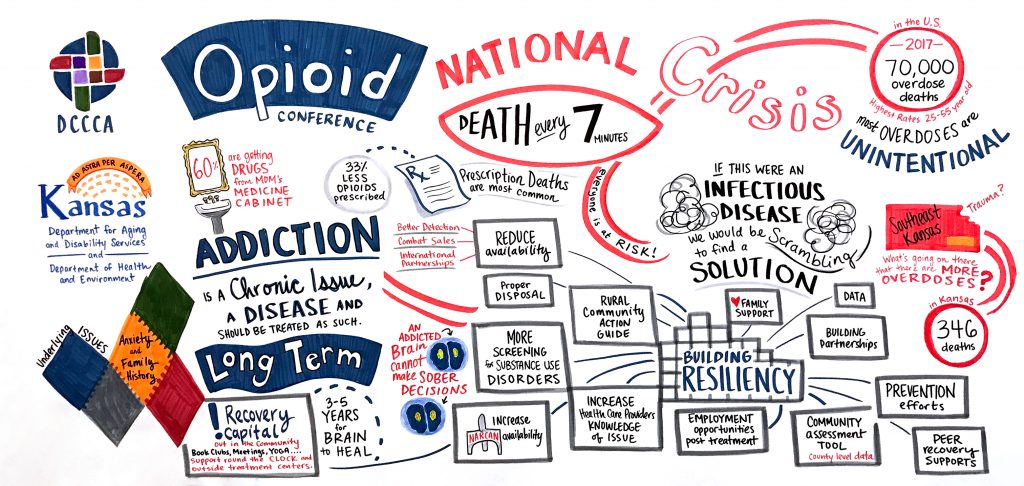
The Opioid Crisis – National and State Perspectives and Initiatives
This speaker will provide an overview of the crisis on the state and national level, and various efforts occurring in Kansas such as the Kansas Prescription Drug and Opioid Advisory Committee, which developed and is implementing a coordinated, multi-disciplinary statewide strategic plan, to provide a comprehensive approach to the opioid crisis in Kansas.
Adrienne Hearrell, MPH, CPTA
Program Manager, Kansas Department of Health and Environment
Office of National Drug Control Policy
Anne Hazlett
Senior Advisor for Rural Affairs, Office of National Drug Control Policy
The National Strategy for Addressing Opioid Addiction and Overdose Deaths
The Regional Director of the U.S. Department of Health and Human Services will discuss the national strategy for addressing opioid addiction prevention, treatment and recovery. The audience will also learn about investments in research, grants, and HHS’ progress.
Jeff Kahrs
Regional Director, U.S. Department of Health and Human Services
Recovery Capital: Building Assets to Sustain Long-term Recovery
Substance use disorders (SUDs) are chronic brain disorders; however, they are too often treated with an acute care model. To improve rates of sustained remission, people with SUDs require long term recovery management. In this session, attendees will learn about recovery capital and how building assets in recovery promotes better recovery outcomes. Throughout, the speaker shares personal experience with addiction and recovery to better explain the various dimensions of, and the need for, recovery capital.
Alex Elswick
Co-Founder, Voices of Hope – Lexington, Inc.
Fentanyl: The Third, and Deadliest, Wave of the Opioid Epidemic
Ben Westhoff is an award-winning investigative journalist who writes about drugs, culture, and poverty. His books are taught around the country and have been translated into languages all over the world. This session will provide a brief introduction to his new book Fentanyl, Inc.: How Rogue Chemists Are Creating the Deadliest Wave of the Opioid Epidemic that was released in September, 2019 by Grove Atlantic.
Ben Westhoff
Author, Fentanyl, Inc.: How Rogue Chemists Are Creating the Deadliest Wave of the Opioid Epidemic
10:30-10:45 Break
10:45-11:30 Breakout sessions – 1
Prescribing Option 1:
Identifying, Treating, and Preventing Medical Complications of Substance Use Disorder for the Primary Care Physician
Together, we’ll explore how various substance use disorders affect the human body and cover key recommendations for clinicians on how to identify, address, and ultimately prevent these potentially life threatening complications of substance use disorders.
Anthony Strickland, MD
CMO, Heartland Community Health Center
Medical Director, DCCCA First Step at Lakeview
Prescribing Option 2:
The Opiate Crisis; Clinician Perspective
The workshop will provide real-world perspective of the Opiate Crisis and the management of difficult chronic pain patients from a national as well as state perspective.
Eric Voth, MD, FACP
Vice President of Primary Care, Stormont-Vail HealthCare
Collaborative Approach to Working with Tribal Communities on Substance Misuse
Slides have not yet been recieved from these speakers.
This presentation will discuss the unique and collaborative approach that has been developed by New Mexico Office of Substance Abuse Prevention (OSAP) to work with tribal communities by addressing behavioral health across the continuum of care and discussion of barriers and facilitators of the process.
Jay Quintana, Synar Coordinator/Prevention Program Manager
NM Human Services Department, Behavioral Health Services Division, Office of Substance Abuse Prevention
Antonette Silva-Jose, Prevention Staff Manager
NM Human Services Department, Behavioral Health Services Division, Office of Substance Abuse Prevention
The Importance of KanCare Expansion to Addressing Substance Use Disorders
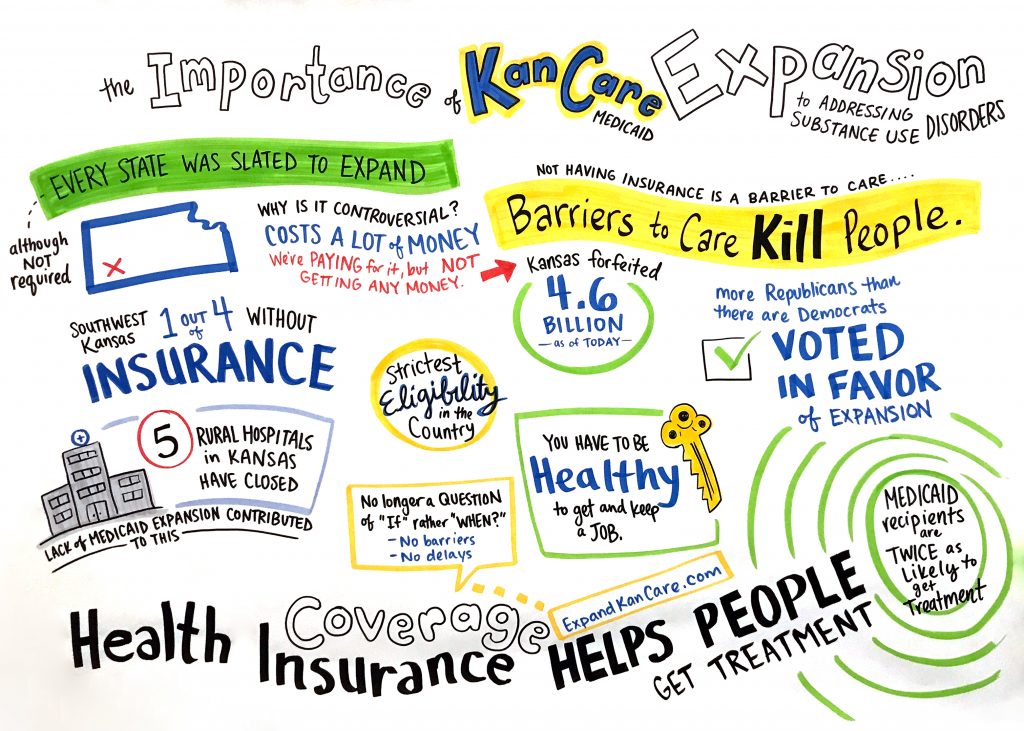
More than 200,000 Kansans are uninsured and therefore lack access to treatment for substance use disorders and mental health. Many of these Kansans would gain coverage if the state expanded its Medicaid program, a policy that has proven critical in addressing the opioid epidemic in other states.
Sheldon Weisgrau, MHS
Senior Policy Advisor, Alliance for a Healthy Kansas
Using ODMAP to Harness Data and Accelerate Action
The Overdose Detection Mapping Application Program (ODMAP) was developed by the Washington/Baltimore High Intensity Drug Trafficking Area (W/B HIDTA) which is a program administered through the Office of National Drug Control Policy (ONDCP). ODMAP provides near real-time suspected overdose surveillance data across jurisdictions to support public safety and health efforts to mobilize an immediate response to an overdose spike. This presenter will provide an overview of best practices which include overdose response teams, collaborative partnerships which facilitate connection to resources, and varying methodologies on how agencies can utilize the data in ODMAP to accelerate action and save lives.
Gordie Burke
ODMAP Outreach Coordinator, Washington/Baltimore HIDTA
Clinical Intervention Option 1:
Elephant Tranquilizer in the Room: The Challenge of Illicit Fentanyl and Fentanyl Analogs
This presentation will be interactive and based on the most recent available medical literature with an emphasis on evidence based conclusions.
Stephen Thornton, MD
Kansas Poison Control Center Medical Director, University of Kansas Health System
Clinical Intervention Option 2:
De-educate to Re-educate: transforming perceptions of pain
Clients come to us with a very important question, “why do I hurt?” Oftentimes past experiences and beliefs have shaped an individual’s ideas about pain. This session will increase the understanding of the modern conceptual model of pain, help providers assess a client’s dominant pain mechanism, and provide tools for treating pain using therapeutic neuroscience education, graded motor imagery, paced exercise, and more.
Dorian Logan, DPT, TPS
Clinic Director, SERC Physical Therapy
11:30-11:45 Break
11:45 – 12:30 Breakout sessions – 2
All I Needed to Know About Pain Management, I Learned on HGTV
Creating a comprehensive integrative pain treatment plan is key to producing safe and effective pain treatment regimens. In this workshop, techniques used by stars of HGTV’s home remodeling shows will be applied to the task of creating such a plan, with emphasis on how using these tactics produce a plan that is patient-centered and promotes patient engagement, while minimizing the unnecessary use of opioids.
Bob Twillman, Ph.D., FACLP
Pain Psychologist, St. Luke’s Hospital
Prevention Option 1:
Fentanyl: The Third, and Deadliest, Wave of the Opioid Epidemic
Drug users rarely ask for fentanyl by name; instead, because it is cheap and powerful, it is used to adulterate meth, cocaine, heroin, and prescription pills. For this reason the fentanyl epidemic is different than previous drug crises, and thus requires new, “harm reduction” approaches to contain it.
Benjamin Westhoff
Author, Fentanyl, Inc.: How Rogue Chemists Are Creating the Deadliest Wave of the Opioid Epidemic
Prevention Option 2:
Drug Endangered Children and Creating Community Alliances
Slides have not yet been recieved from these speakers.
In this session, participants will be introduced to the concept of “Drug Endangered Children.” The course identifies factors which create an environment where the possession, use, distribution, and/or manufacture of controlled substances endanger the health and safety of children. It will also discuss best practices for working with drug endangered children and their families. Finally, it will describe methods for inter-agency cooperation to provide a safe environment for drug endangered children. Understanding the special needs of drug endangered children and recognizing the specific risks associated with children being exposed to controlled substances is of importance to anyone who has contact with children and/or families. Individuals working within their communities through: child welfare, law enforcement, prosecution, substance abuse prevention and/or treatment, medical care, education, local government, and housing authorities should be particularly interested. Cooperation and teamwork among agencies are the cornerstones of protecting children from the dangers of home environments where controlled substances are used, possessed, sold or manufactured. The information presented will include sources such as the National Alliance for Drug Endangered Children, the Kansas Alliance for Drug Endangered Children, and local DEC Alliances in Shawnee and Sedgwick Counties.
Cristi Cain, MPH
Director, Local Public Health Program, Kansas Department of Health and Environment
Dulcinea Rakestraw, MPH
Drug Misuse Data Researcher, Sedgwick County Health Department
Treatment and Recovery Option 1:
A Comparison of Treatment Models: Harm Reduction vs. Abstinence
This presentation will present professionals with knowledge regarding the care and treatment of MAT patients. They will understand similarities and differences in counseling techniques and regulatory requirements for MAT. This will help the audience understand issues encountered by individuals with opioid addictions and how to address them in an outpatient treatment setting. The audience will be encouraged to participate in case conceptualization and discussion of the topic.
Stacy Chamberlain, MA, LMAC
Program Director, BHG/Overland Park Treatment Center
Rachael Barncard
Counselor, BHGOverland Park Treatment Center
Treatment and Recovery Option 2:
Emergency Department – Initiated Opioid Overdose Programming: Saving Lives, Reclaiming Futures
No slides provided for this session.
This presentation will discuss the foundational work and current Missouri efforts of establishing hospital-based bridge models, whereby opioid overdose survivors are immediately linked to OUD treatments and ancillary support services, e.g. housing. Engaging Patients In Care Coordination (EPICC) – an ED-based opioid overdose program – aims to connect individuals from emergency rooms (ER) to community substance use treatment, with an emphasis on utilizing Medication-Assisted Treatment (MAT) in the ER.
Shawn Billings
Director of Substance Use Programming, Missouri Hospital Association
Doug Burgess, MD
Truman Medical Center
Holly Hagle
University of Missouri-Kansas City
Linda Campbell
CommCARE
Please stop loving your kids to death…
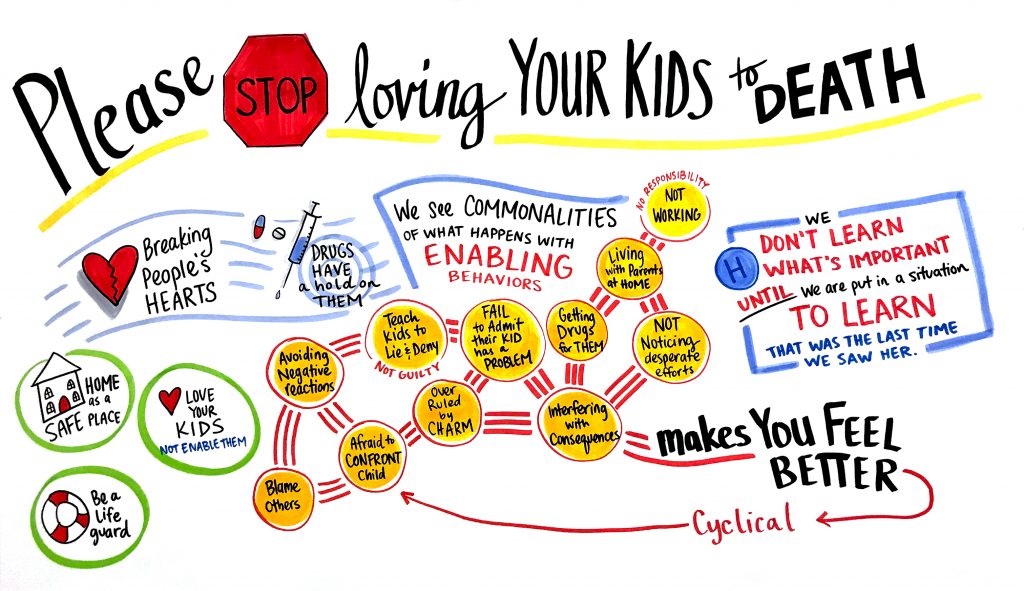
This presentation will cover the common side effects of drug (opiate) abuse. It focuses on the family and friends of the user and their role in the stages of addiction.
Darren Barker
Instructor, Kansas Law Enforcement Training Center
The Spawn of the Opioid Epidemic: Self-Treatment of Opioid Dependence/Withdrawal and Toxicity
This presentation will examine the use and toxicity of ibogaine, kratom, and loperamide which are often used by opioid dependent patients to self-treat opioid withdrawal symptoms and dependency.
Stephen Thornton, MD
Kansas Poison Control Center Medical Director, University of Kansas Health System
12:30 – 1:30 Lunch (Provided)
1:30 – 2:15 Breakout Session 3
Prescribing Option 1:
Pain Management Best Practices Inter-Agency Task Force Report- A Summary
This session will summarize the gaps and recommendations identified by the Pain Management Best Practices Inter-Agency Task Force Report released May 2019.
Melanie Simpson, PhD, RN-BC, OCN, CHPN, CPE
Pain Management Resource Team Coordinator, The University of Kansas Hospital
Prescribing Option 2:
Lessons Learned from Rural Prescribers
Join us as we discuss a one-of-a-kind dinner, hosted by Dr. Jen McKenney on a winter’s evening, and learn why each of the Wilson County prescribers came and what they shared.
Jen McKenney, MD
Bacani McKenney Clinic, Fredonia, KS
Carla Deckert, MA, PMP
Project Director Project ECHO, University of Kansas Medical Center
Prevention Option 1:
Implementing the Partnerships for Success Initiative: Substance Abuse Prevention in Two Kansas Communities
Slides have not yet been recieved from these speakers.
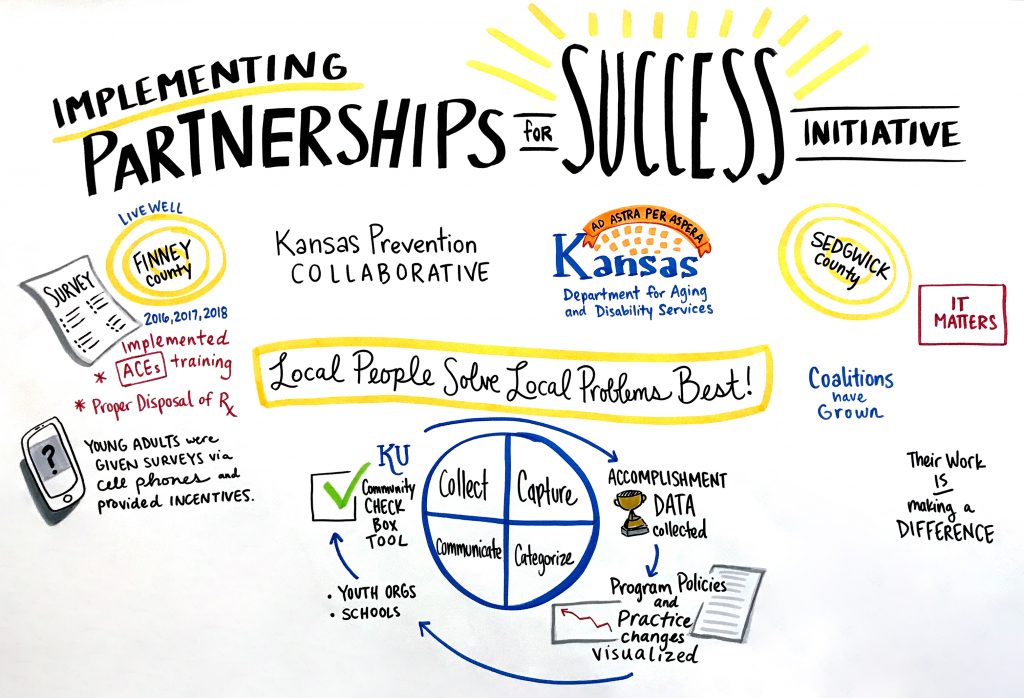
Between 2016 and 2019, the Kansas Strategic Prevention Framework Partnerships for Success 2015 Rx Initiative was initiated and implemented to prevent and reduce prescription drug misuse. The grant was awarded by SAMHSA to the Kansas Department of Aging and Disability Services. Efforts were supported by the Kansas Prevention Collaborative (KPC) through integration and innovation in statewide behavioral health prevention efforts. DCCCA, a KPC contractor, was awarded funds to guide two target communities in Kansas with high Rx misuse prevalence through the SPF process. In this session, the presenters will review processes for implementation of evidence-based strategies, supports offered through the KPC, and program and community level process and outcome data for two participating communities.
Priya Vanchy
Graduate Teaching Assistant, KU Center for Community Health and Development
Dola Gabriel
Senior Research Assistant/Program Coordinator, KU Center for Community Health and Development
Kristin Heuer
Program Evaluator, Greenbush – The Southeast Kansas Education Service Center
Chad Childs, MSFT, LCMFT
Prevention Systems Project Coordinator, Community Engagement Institute, Wichita State University
Prevention Option 2:
Implementing Screening, Brief Intervention, and Referral to Treatment (SBIRT) at a Federally Qualified Health Clinic (FQHC) for Substance Use Prevention
In 2018, the Sedgwick County Health Department (SCHD) received Opioid Overdose Crisis Response cooperative agreement funds from the Kansas Department of Health and Environment (KDHE) to collaborate with the University of Kansas Medical Center – Wichita to identify and implement opioid misuse-related prevention strategies. One strategy selected was to assist HealthCore Clinic, a Federally Qualified Health Center, in implementing and evaluating Screening, Brief Intervention, and Referral to Treatment (SBIRT). SBIRT is an evidence-based practice to identify, reduce, and prevent risky health behaviors related to the misuse of prescription opioids and other substances such as alcohol and illicit drugs. This session will provide an overview of SBIRT, describe how continuous quality improvement strategies and workflow analysis can be utilized in program implementation, and discuss how other communities can use these lessons learned to address similar needs.
Dulcinea Rakestraw, MPH,
Drug Misuse Data Researcher, Sedgwick County Health Department
Fatima Rahman, MPH,
Drug Misuse Data Coordintator, Sedgwick County Health Department
Leveraging Nurses to Expand Access to Treatment for Opioid Use Disorder: Massachusetts Nurse Care Model of Office Based Addiction Treatment
This talk will provide an overview of the nationally recognized and nationally replicated Massachusetts Nurse Care Manager Model of Office Based Addiction Treatment.
Kristin Wason, MSN, NP, CARN
Nurse Practitioner, Boston Medical Center’s OBAT
Unconventional Prosecution and the Opioid Crisis
A discussion of the unique decisions and responses prosecutors face in the prosecution of the opioid dealer, user and community needs.
Kim Parker
Prosecutor Coordinator, District Attorney’s Assocation
Cancer patients and survivors: Shedding light on an overlooked population in the opioid crisis response
Slides have not yet been recieved from this speaker.
Cancer patients and survivors are almost universally excluded from opioid-related research despite being large in numbers and having multiple risk factors for adverse opioid use patterns and outcomes. This presentation shares new insights into the risks of opioid misuse, addiction, and overdose as potential complications of cancer care.
Andrew Roberts, PharmD, PhD
Assistant Professor, University of Kansas Medical Center
2:15 – 2:30 Snack Break
2:30 -3:15 Breakout Session 4
Pearls and Pitfalls of Drug Testing
This presentation will describe important components of the drug testing regimen, classic pitfalls in interpreting drug testing results, and pearls for dealing with common testing abnormalities. The goal is to help those responsible for drug testing implementation and interpretation to improve the chance that testing provides more clarity and less confusion.
Daniel Warren, MD
Assistant Professor, Department of Family and Community Medicine, University of Kansas School of Medicine-Wichita
Ashley Haynes, MD
Prevention Option 1:
Reducing Prevalence of Addiction Begins with Youth Prevention: One Choice for Health
The adolescent brain is hardwired for risk-taking putting teens at the highest risk for problems related to substance use including addiction. Reducing the risk of future substance use problems, including addiction, begins with prevention of youth drug use.
Finally, this presentation will review the biology of addiction and the concept of “hijacked brain” and the direct implications for youth drug prevention. This workshop will present a straightforward and clear prevention message for youth under age 21. One Choice: Do not use any alcohol, nicotine, marijuana or other drugs for reasons of health.
Dr. Caroline DuPont
Vice President of the Institute for Behavior and Health
Corinne Shea
Director of Programs & Communications at the Institute for Behavior and Health
Prevention Option 2:
Your Meds Your Matter: Rx Drug Prevention Media Campaign
Slides have not yet been recieved from these speakers.
America is experiencing an opioid addiction and overdose crisis. Each of us has a decision to make; we can choose to be part of the problem … or part of the solution. Your Meds. Your Matter. is an awareness and prevention campaign designed to help Johnson County, KS and Platte County, MO residents move toward a solution. It encourages this audience to take notice of the issue, take responsibility for prescription medications by monitoring, locking up and disposing of opioid pills, and take action by utilizing available resources to help combat the crisis. #YourMedsYourMatter
Jamie Katz
Prevention Coordinator, Johnson County Mental Health Center
Lee Stiegemeier
Verbal Artist, Circle Sideways
Anna Ladd
Visual Artist, Circle Sideways
Prevention Option 3:
The Chemistry of Drug Use: Why Trauma Increases the Risks
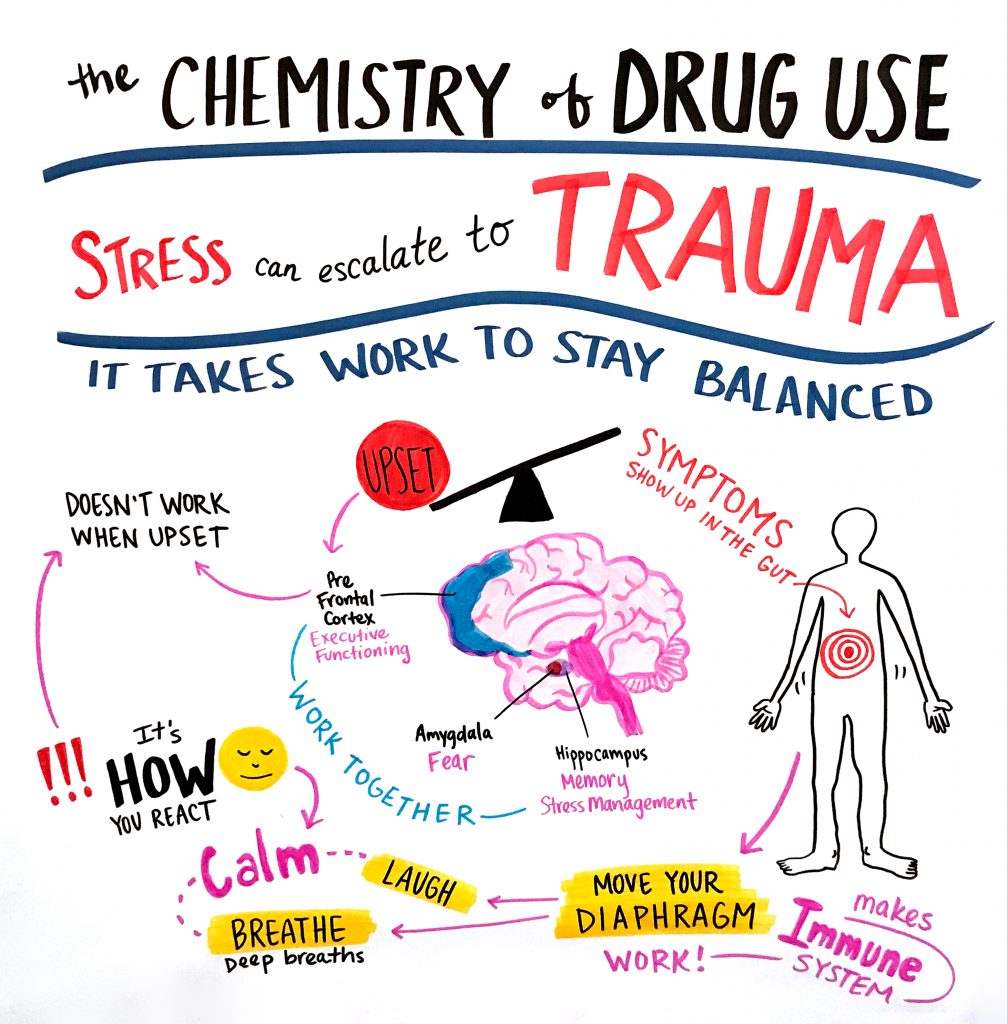
It’s not what happens to us that gets us into trouble; it’s how we respond. Out of the hundreds of bio-chemicals our body makes, there are a few that can make or break us: those that ramp us up and those that calm us down. Humans are wired so that the chemicals that ramp us up are released automatically, whenever we encounter something uncomfortable or distressful. And, when we get “ramped-up”, the thinking and remembering parts of our brain take a rest until things calm down again. Trauma increases the impact of our bio-chemical ramp-up. “Trauma” is defined as being overwhelmed by a situation or condition. Overwhelmed means that the demands of a situation or condition exceed or ability to cope. That means if we have not learned coping habits to trigger our calming chemicals, our thinking and remembering parts of our brains will stay out of commission — and we will begin to search for anything to take the edge off. And, remember that being “bored” is just as uncomfortable for a teen, whose brain is working 50-80 times faster than the average adult brain, as pain is for an adult.
Karen Williams, MSSW
Youth Development Consultant & Trainer in Private Practice
Treatment & Recovery Option 1:
No Man’s Land: A Rural Clinician’s Perspective On Addressing the Opioid Crisis
This session focuses on the professional, clinical, and ethical issues rural behavioral health providers encounter when treating dually-diagnosed individuals. Three strategies will be reviewed to assist behavioral health providers increase their confidence in responding to the opioid epidemic: Project ECHO, the National Health Service Corps Loan Repayment Program, and Telemedicine.
Shawna Wright, Ph.D., LP
Associate Director, KU Center for Telemedicine
Treatment & Recovery Option 2:
Development of the Quality & Value Innovation Consortium (QVIC) Opioid Management Project
Speakers have not released this presentation to be shared publicly.
This presentation describes the initial development activities of the Quality & Value Innovation Consortium (QVIC) Opioid Management Project, including the implementation model, process mapping, and evaluation methods. The Opioid Management Project assists with the enhanced implementation and evaluation for the Kansas City Engaging Patients in Care Coordination (KC EPICC). KC EPICC is based on a risk reduction and recovery-oriented model of care that provides intensive referral services. The Opioid Management Project utilizes the Exploration, Adoption/Preparation, Implementation, Sustainment (EPIS) implementation model for implementation (Aarons, Hurlburt, & Horwitz, 2011). Six hospitals are participating in this intervention and mixed-methods evaluation.
Yifei Liu, B.S. Pharm, Ph.D.,
Associate Professor, University of Missouri – Kansas City
Holly Hagle, Ph.D.
Assistant Research Professor, University of Missouri – Kansas City
Tracey A. LaPierre, Ph.D., MSc
Associate Professor, University of Kansas
Danielle Olds, MPH, PhD, RN
Associate Professor, University of Kansas
The Opioid Epidemic & First Responders
This presentation will provide first responders with tools to address Opioid Use Disorder within their communities including prosecution, treatment and prevention efforts.
Lindsay Powers
Eastern Iowa Heroin Initiative Coordinator/Police Officer, Midwest HIDTA, Cedar Rapids Police Department
Potential opioid use reduction with chiropractic care and other complementary health care interventions: A narrative review
Slides have not yet been recieved from this speaker.
Complementary and alternative interventions may reduce use of opioids for painful conditions. The purpose of this project is to review current published evidence on the use of complementary and alternative care interventions for treatment of pain and reduction in opioid use.
Mark Pfefer
Director of Research/ Professor, Cleveland University Kansas City/ Chiropractic and Health Sciences Division
3:15-3:30 Break
3:30 – 4:30 Closing Keynote Speakers
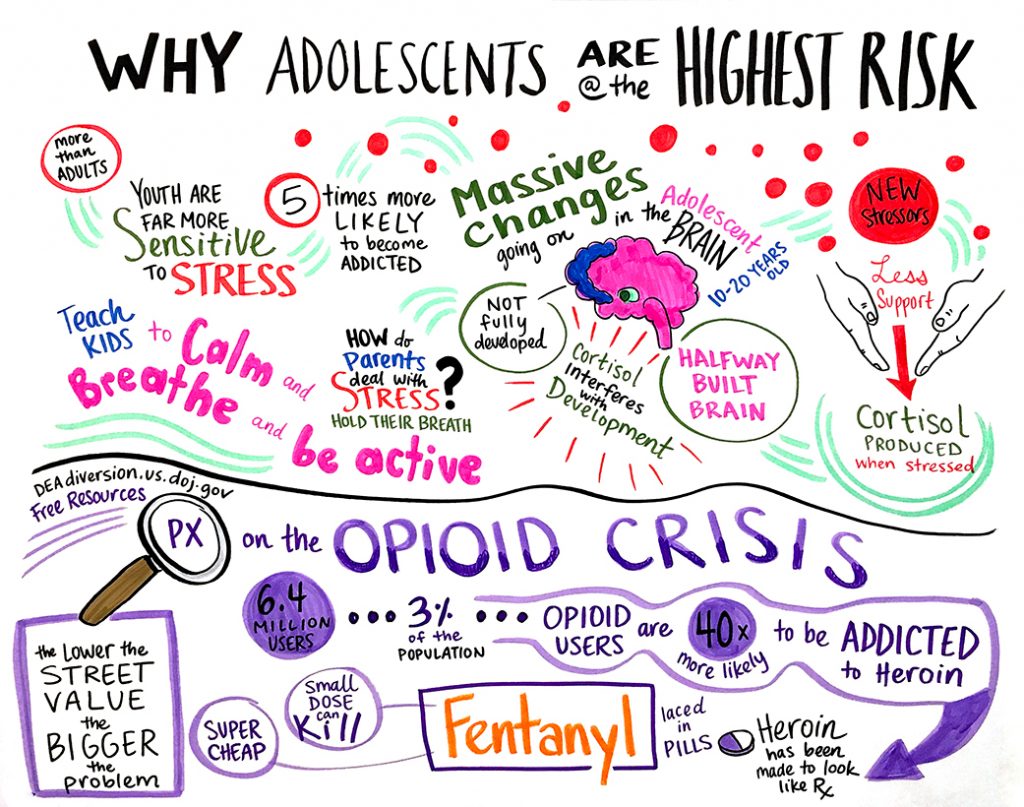
Why Adolescents Are at the Highest Risk
This presentation provides an overview of the developmental risks that every teen faces because of how the brain develops, how biology and trauma collide to set them up, and the basic steps communities can take to mitigate the risks.
Karen Williams, MSSW
Youth Development Consultant & Trainer in Private Practice
Drug Enforcement Administration (DEA) Perspectives on the Opioid Crisis
DEA representative Dean Reynoldson will provide an overview of DEA perspectives on the opioid crisis including current trends in the region. This speaker will also share information about the DEA’s free educational programs, resources, materials, and Drug Take Back Programs.
Dean Reynoldson
Diversion Investigator, U.S. Department of Justice, Drug Enforcement Administration




